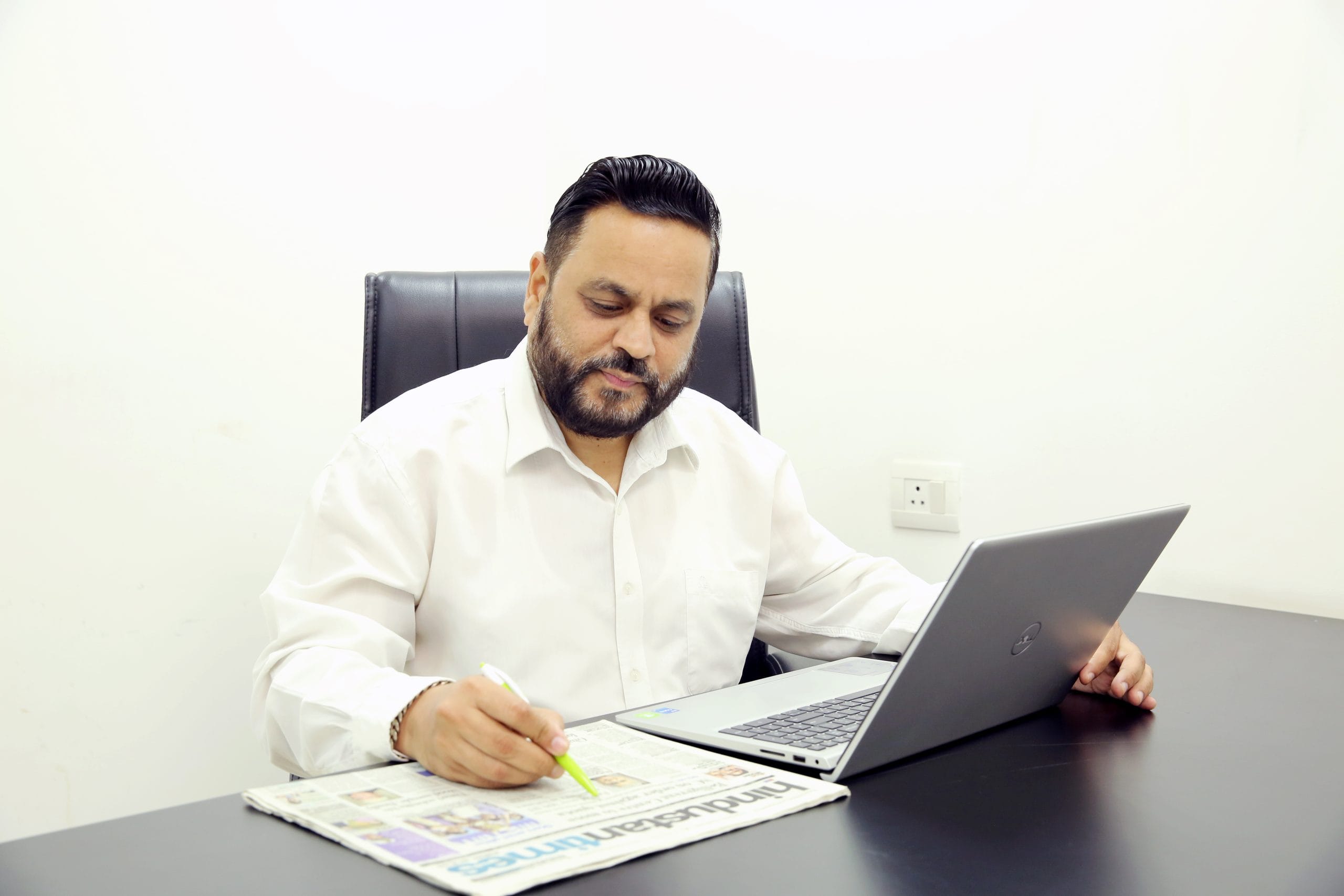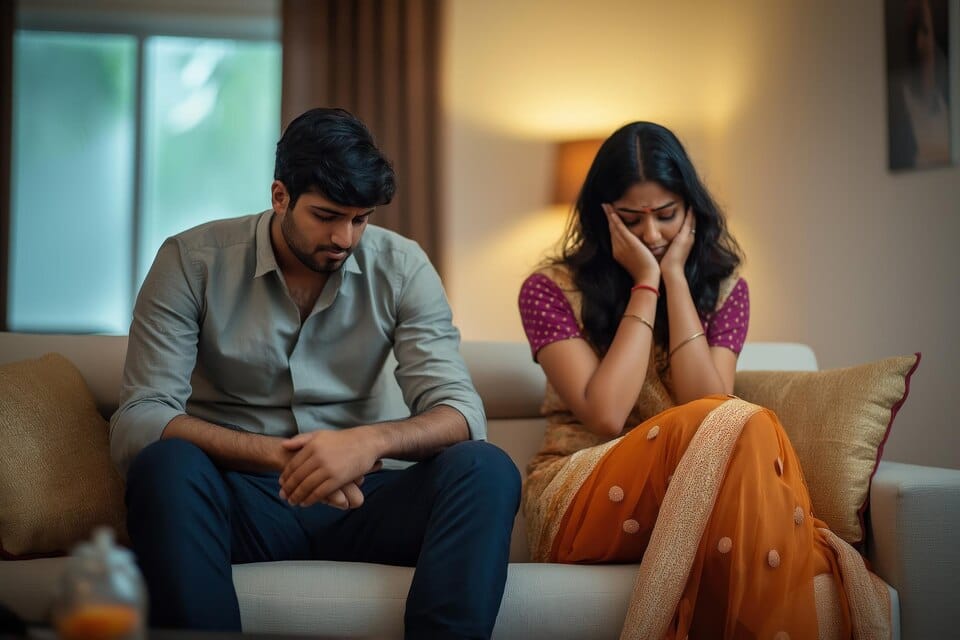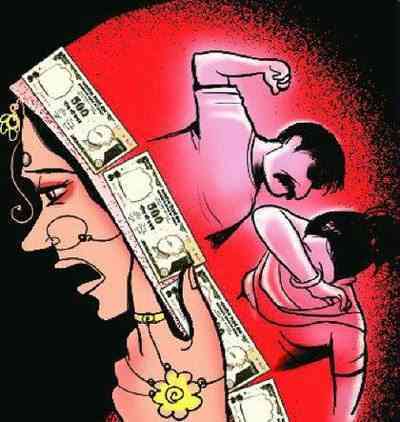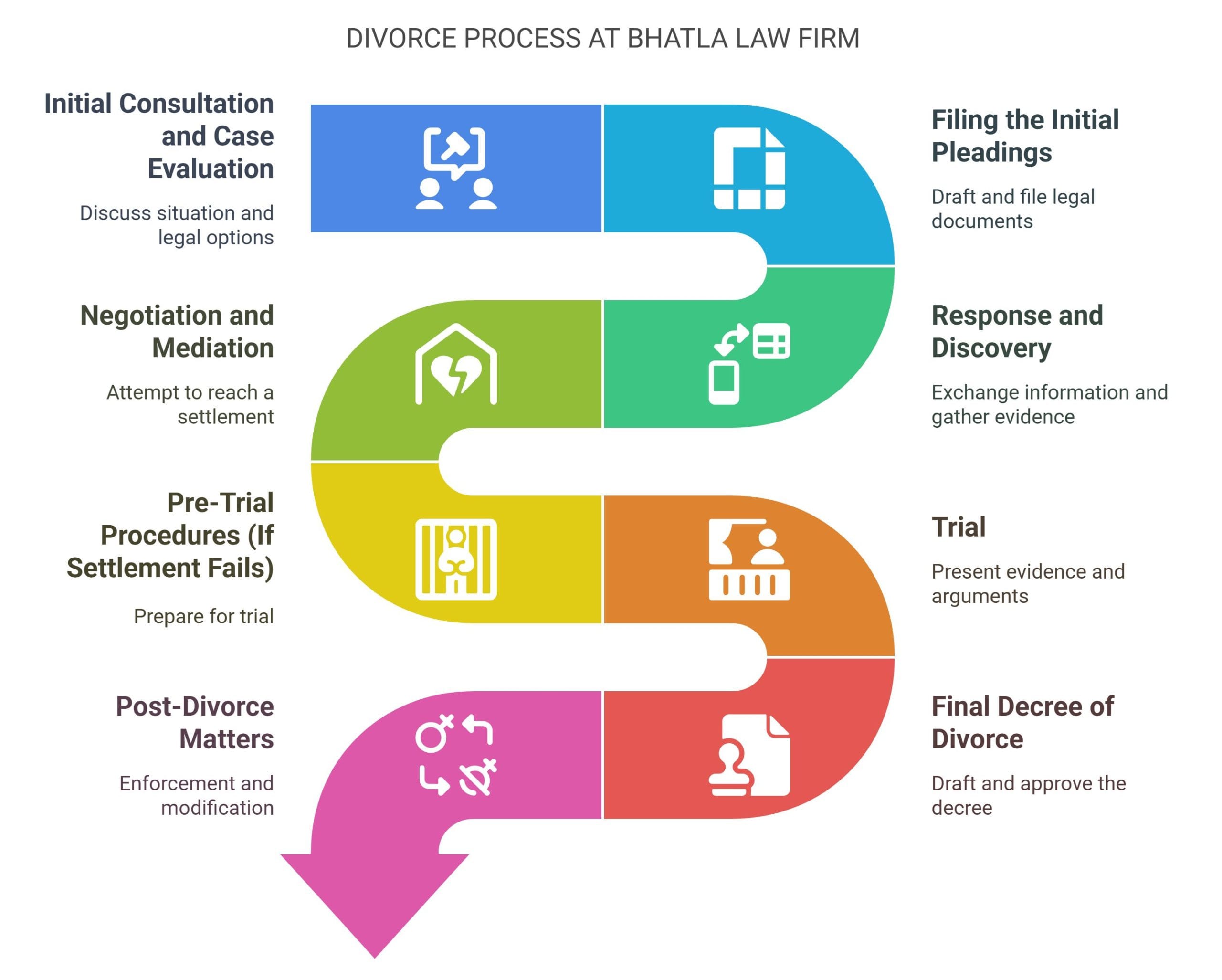Committed to professionalism, confidentiality, and client empowerment.


Over 20 years of experience in Delhi courts with deep expertise in family law.
Handled 1,000+ successful family law cases across Delhi NCR with a results-driven approach.
Personalized legal strategies with clear & honest communication.
Committed to professionalism, confidentiality, and client empowerment.
At Bhatla Law Firm, we understand that family disputes and divorce proceedings can be emotionally and legally complex. Our comprehensive divorce law services are designed to guide you through every stage of the process with clarity, compassion, and expertise.
Whether you are seeking an amicable mutual consent divorce, navigating a contested separation, or addressing sensitive matters like child custody and domestic violence, our experienced legal team—including a trusted divorce lawyer in Delhi — is here to protect your rights and interests. We combine decades of courtroom experience with a client-first approach, ensuring that you receive practical legal solutions tailored to your unique situation.
Discover how our specialized services can help you achieve a fair and timely resolution.
Mutual consent divorce is the most straightforward and harmonious way for couples to legally end their marriage in India. When both spouses agree to separate, this process minimizes conflict and emotional strain, allowing for a dignified closure.
At Bhatla Law Firm, our experienced mutual divorce lawyer in Delhi helps you draft a comprehensive Memorandum of Understanding (MoU) covering property division, child custody, alimony, and all relevant terms. Our team ensures every document is prepared accurately and filed in the appropriate family court.

The process begins when both spouses jointly file a petition under Section 13B(1) of the Hindu Marriage Act, 1955 (or corresponding laws for other religions) in the Family Court. This petition must clearly state that:
The petition must include full details of the marriage—such as date and place of marriage, details of children (if any), financial and property settlements, custody agreements, and alimony terms. Both parties must sign the petition. Legal consultation is often advised at this stage to ensure that rights, responsibilities, and terms are clearly outlined.
After filing the petition, the court schedules a date for the first motion hearing. On this date:
Both spouses must appear in court in person.
The judge verifies that both parties have freely and voluntarily signed the petition.
Their statements are recorded under oath, confirming mutual consent and satisfaction with agreed terms.
If the judge is convinced that the consent is genuine and there’s no coercion or fraud, the court records the first motion and moves to the next step.
Once the first motion is accepted, a six-month waiting period (also called the cooling-off period) is imposed as per Section 13B(2). The purpose of this period is:
To give the couple time for reconciliation,
To ensure the decision is not made in haste,
And to allow time to resolve any outstanding disputes amicably.
However, this period can be waived by the court in certain situations, such as:
If the couple has been separated for over 18 months,
If there are no chances of reconciliation,
And if the matter is settled amicably.
A waiver request can be submitted through an application supported by affidavits from both parties.
After the cooling-off period (or its waiver), both parties must again appear before the court to reaffirm their decision to seek divorce. This is called the Second Motion. At this stage:
The court once again records fresh statements of both parties under oath,
It verifies whether both parties still consent freely to the divorce,
And checks if all terms regarding alimony, custody, maintenance, and property have been mutually settled.
If either party withdraws their consent at this stage, the petition stands dismissed.
If the court is satisfied that:
Consent is genuine,
All settlement terms are fair and mutually accepted,
And both motions are complete,
It will pass a decree of divorce, officially dissolving the marriage. This decree is legally binding and comes into effect immediately.
Both parties are then free to remarry or live separately with full legal recognition.
A contested divorce occurs when one spouse does not consent to the divorce, or disputes arise regarding matters like alimony, child custody, property division, or cruelty and desertion allegations. This type of divorce is more complex and time-consuming, often requiring strong legal representation and thorough documentation.
At Bhatla Law Firm, we protect your legal rights, prepare a strong case, represent you in court hearings, and help you navigate this emotionally challenging process with clarity and confidence.

One spouse (the petitioner) files a divorce petition under Section 13 of the Hindu Marriage Act, 1955, citing valid legal grounds such as cruelty, adultery, desertion, mental disorder, or conversion of religion. The petition includes detailed facts, incidents, and evidence supporting the claims.
After admitting the petition, the family court issues a notice to the other spouse (the respondent) to appear and respond to the allegations.
The respondent submits a written reply, either denying the allegations or raising counterclaims such as cruelty or financial demands.
At this stage, both parties may attempt mediation or settlement, which the court may encourage to avoid prolonged litigation.
If no settlement is reached, the court begins the trial phase, where both parties present:
Witness testimonies
Documents, such as medical reports, financial records, or photographs
Cross-examinations and legal arguments by advocates
Once evidence is submitted, both sides present final arguments. The court then evaluates the case and delivers a judgment, which may include:
Granting or denying the divorce
Orders on custody, maintenance, alimony, and property
Enforcement of any protective or restraining measures
If either party is dissatisfied with the judgment, they can file an appeal in a higher court within the prescribed time limit.
Child custody and guardianship are critical concerns during and after divorce proceedings, especially when minor children are involved. In India, custody is decided based on the best interest and welfare of the child—not automatically in favor of either parent.
At Bhatla Law Firm, we assist parents in presenting a strong case for custody—be it physical custody, joint custody, or visitation rights.
We guide you through court proceedings, documentation, and negotiations to ensure your child’s emotional and physical wellbeing is prioritized.

Types of Custody in India:
Physical Custody: The child lives primarily with one parent, while the other gets visitation rights.
Joint Custody: Both parents share physical custody at different times, promoting active involvement.
Legal Custody: One or both parents get the right to make decisions on education, healthcare, etc.
Sole Custody: Granted when one parent is deemed unfit due to violence, instability, or neglect.
Whether you’re a mother or father seeking custody or opposing a wrongful guardianship claim, our legal team ensures your side is strongly represented in court.
We also help with filing guardianship petitions under the Guardians and Wards Act, 1890 for situations involving orphaned children, step-parental care, or long-term guardianship arrangements.
Alimony and maintenance are legal provisions that ensure financial support for a spouse who is unable to sustain themselves after separation or divorce. These payments can be temporary or permanent, depending on the circumstances of the case.
At Bhatla Law Firm, we help you pursue or defend claims for fair and just financial support. Whether you’re seeking maintenance under Section 125 CrPC, the Hindu Marriage Act, or Protection of Women from Domestic Violence Act, our experienced team ensures your rights are protected.

Division of property and assets during a divorce can be one of the most complex and emotionally charged aspects of separation. In India, marital property is not automatically split 50-50. Instead, courts consider ownership, contributions, and fairness while deciding on distribution.
At Bhatla Law Firm, we help you navigate the legal process of identifying, valuing, and dividing both movable and immovable assets—such as houses, vehicles, joint bank accounts, investments, and business interests.
We assist with negotiation, mediation, and if necessary, litigation to ensure a fair and lawful distribution. Our team also helps draft and review settlement deeds to prevent future disputes.
Whether you’re protecting your rightful share or seeking a balanced settlement, we provide clear legal guidance tailored to your unique situation.

Domestic violence and dowry harassment are serious violations of human dignity and legal rights. Victims—mostly women—often suffer in silence due to social pressure, fear, or lack of awareness. Indian law offers strong protections under the Protection of Women from Domestic Violence Act, 2005, and Section 498A of the Indian Penal Code (IPC).
At Bhatla Law Firm, we provide immediate legal support to individuals facing physical abuse, emotional trauma, financial control, or harassment related to dowry demands. If you’re in need of a divorce lawyer in Delhi with experience handling domestic violence and dowry-related cases, our team is here to support you.
Whether you are a victim seeking protection or someone wrongly implicated, we’re committed to securing justice and peace of mind through strong legal intervention.


To file for divorce, you'll typically need:
Marriage certificate
ID proof of both parties
Address proof
Passport-sized photographs
Income and property documents (in case of alimony/property matters)
Proof of allegations (in contested divorce, if any)
Our legal team helps collect, verify, and organize all documents to ensure a smooth filing process.
In most mutual consent divorce cases, two court appearances are required, but if you're an NRI or have a valid reason, you may file through a Power of Attorney or request exemption from personal appearance. Our firm handles such cases regularly and can help you avoid unnecessary court visits.
If your spouse refuses to agree, you can still file for a contested divorce under valid legal grounds such as cruelty, adultery, desertion, etc. Our lawyers will represent your case in court and help you through the process confidently.
Mutual consent divorce: Minimum of 6 months (can be waived in some cases)
Contested divorce: 1 to 3 years depending on complexity and court workload
We work to fast-track your case wherever possible using strong documentation and regular follow-ups.
Child custody depends on several factors: the child’s age, welfare, education, emotional bonding, and financial stability of each parent. We help you build a strong case to secure either full custody or fair visitation rights.
Yes, especially in contested divorce cases, the court may send the couple for mediation or counselling to try for reconciliation. If differences are irreconcilable, the court proceeds with the case. Our firm assists you during these sessions as well.
Yes, even working women can claim maintenance or alimony if there is a significant income difference, or if the woman sacrifices her career for the marriage or children. The court decides based on financial dependency and lifestyle.
Absolutely. Physical or emotional abuse, including dowry-related harassment, is a strong legal ground for contested divorce. We help you file criminal complaints (under 498A or Domestic Violence Act) along with the divorce petition to ensure your safety and justice.
Best Family & Divorce Lawyer with presence across Delhi, Gurugram & Noida.
*We also provide services for Special Marriage Act Divorce Cases
© 2024 – BLF – All Rights Reserved / Made with ❤️ in India by Bloomsweb